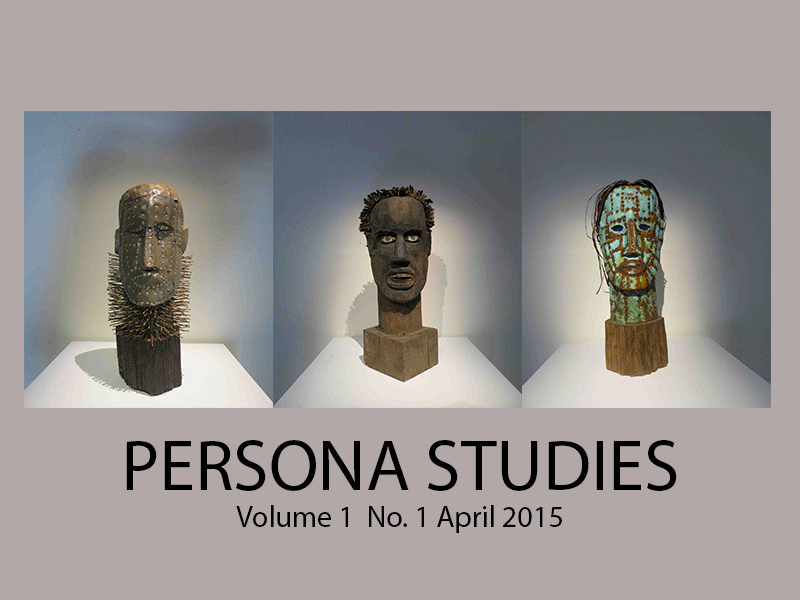Forming Persona Through Metrics: Can We Think Freely in the Shadow of Our Data?
DOI:
https://doi.org/10.21153/ps2015vol1no1art451Keywords:
quantified self, wearables, self-tracking, personal metrics, technological affordancesAbstract
The use of biosensors in wearable activity tracking devices to measure, record and share many aspects of life has been received with great enthusiasm for their potential to enhance conceptions of self through measuring variables relating to an individual’s health and productivity. In 2012, readers of the Economist were introduced to the idea of using numbers on oneself in the same way that charting progress towards a goal is commonplace in business. A new culture of self-improvement termed ‘self-tracking’ was beginning to gain currency. At the time that self-tracking was becoming mainstream it was estimated that the mobile health and diagnostics market was worth approximately US$640 million, which would grow to US$8.03 billion by 2019. In popular culture (news items and blogs), people who track their activity using technology are seen as heroic figures who are insightful, actualised, virtuous, and in control. Experimentation (trial and error), active intervention (a health kick, diet or detox), preventative self monitoring (blood pressure, glucose levels, heart rate) or the conscious foregrounding of habits (hydration, caffeine intake, counting steps) are constructed as rewarding. This can be seen as a manifestation of applying management principles to personal healthcare, and by extension the practice of applying an exacting science to the management of everyday life. Focusing on three current consumer technologies: Fitbit, Jawbone UP and Apple’s HealthKit application and developer platform, we argue that using such devices fixes individuals to symbolic discourses, permissions, limits, and thresholds, which prefigure and enclose energies directed towards the formation of self-knowledge and conception of selfhood.
Downloads
References
Balm, Gerald J. "Benchmarking and gap analysis: what is the next milestone?." Benchmarking for Quality Management & Technology 3.4 (1996): 28-33.
Barbour, Kim, P. David Marshall, and Christopher Moore. "Persona to Persona Studies." M/C Journal 17.3 (Jun. 2014). 19 Feb. 2015 http://journal.media-culture.org.au/index.php/mcjournal/article/view/841
Bauman, Zygmunt. Liquid Modernity. Cambridge, UK: Polity Press, 2000. Print.
Beck-Gernsheim, Elisabeth. Life As a Planning Project. in Lash, Scott, and Bronislaw Szerszynski (eds.). Risk, Environment and Modernity: Towards a New Ecology. London Sage Publ, 1996. Print.
Bell, C G, Jim Gemmell, and C G. Bell. Your Life, Uploaded: The Digital Way to Better Memory, Health, and Productivity. New York: Plume, 2010. Print.
Bijker, Wiebe E. Of Bicycles, Bakelites, and Bulbs: Toward a Theory of Sociotechnical Change. Cambridge, Mass: MIT Press, 1995. Print.
Bolter, J D, and Richard Grusin. Remediation: Undestanding New Media. London: The MIT press, 2002. Print.
Bush, Vannevar. "As We May Think." Atlantic. 176.1 (1945). Print.
Canguilhem, Georges. The Normal and the Pathological. New York: Zone Books, 1989. Print.
Costa-i-Font, Joan, Christophe Courbage, and Alistair McGuire. The Economics of New Health Technologies: Incentives, Organization, and Financing. Oxford: Oxford University Press, 2009. Print.
Donaldson, Stewart I., and Elisa J. Grant-Vallone. "Understanding self-report bias in organizational behavior research." Journal of Business and Psychology 17.2 (2002): 245-260.
Gergen, Kenneth J. The Saturated Self: Dilemmas of Identity in Contemporary Life. New York: Basic Books, 1991. Print.
Floridi, Luciano. The Philosophy of Information. Oxford England: Oxford University Press, 2011. Print.
Giddens, Anthony. Modernity and Self-Identity: Self and Society in the Late Modern Age. Stanford, Calif: Stanford University Press, 1991. Print.
Golko, A.J., M.W. Schmidt, and F. Alvarez. "Wrist-Worn Electronic Device and Methods Therefor." Google Patents, 2012. Print.
Jethani, Suneel and Daly, Angela. Fitness Tracking Data in Courts — Persuasive But Not Conclusive. The Conversation 24 November 2014.
Hassan, Robert. "Our Post-Modern Vanity: The Cult of Efficiency and the Regress to the Boundary of the Animal World." Philosophy & Technology (2014): 1-19. Print.
Hayles, N. K. (2006). Traumas of code. Critical Inquiry, 33(1), 136-157.
Huffington, Arianna S. Thrive: The Third Metric to Redefining Success and Creating a Life of Well- Being, Wisdom, and Wonder. , 2014. Print.
Latour, Bruno. Reassembling the Social: An Introduction to Actor-Network-Theory. Oxford: Oxford university press, 2007. Print.
Lefebvre, Henri. Rhythmanalysis: Space, Time, and Everyday Life. London: Continuum, 2008. Print.
Lupton, Deborah. Self-Tracking Modes: Reflexive Self-Monitoring and Data Practices (August 19) 2014. Available at SSRN: http://ssrn.com/abstract=2483549 or http://dx.doi.org/10.2139/ssrn.2483549
Marcuse, Herbert. One-dimensional Man: Studies in the Ideology of Advanced Industrial Society. Boston: Beacon Press, 1964. Print.
McLuhan, Marshall. Understanding Media: The Extensions of Man. , 1964. Print.
Merleau-Ponty, Maurice. Phenomenology of Perception. Oxon: Routledge, 2014. Print.
Morozov, Evgeny. To Save Everything, Click Here: The Folly of Technological Solutionism. , 2013. Print.
Mumford, Lewis. Technics and Civilisation. New York N.Y.: Harcourt, Brace and Co, 1934. Print.
Nafus, Dawn, Sherman, Jamie. “The Quantified Self Movement is not a Kleenex.” http://blog.castac.org/2013/03/the-quantified-self-movement-is-not-a-kleenex . Accessed 10 December 2014.
Nowotny, Helga. Time: The Modern and Postmodern Experience. Cambridge, UK: Polity Press, 1994. Print.
Power, Michael. "The audit society—Second thoughts." International Journal of Auditing 4.1 (2000): 111-119.
Røssaak, Eivind. "The Archive in Motion: An Introduction." The Archive in Motion (2010): 11-26.
Rothenberg, David. Hand's End: Technology and the Limits of Nature. Berkeley: University of California Press, 1993. Print.
Strathern, Marilyn. Audit Cultures : Anthropological Studies in Accountability, Ethics, and the Academy. London; New York: Routledge, 2000. Print.
Stephens, Elizabeth, “Normal, normalisation, normativity”, Transgender Studies Quarterly, vol. 1, no. 1 2013, pp. 203-206.
Stiegler Bernard, and Stephen Barker. Technics and Time. 2, Disorientation. Stanford, Calif.: Stanford University Press, 2009. Print.
Stivoric, J., F. Gemperle, and C. Kasabach. "Wearable Human Physiological Data Sensors and Reporting System Therefor." Google Patents, 2003. Print.
Townley, Barbara. Reason's Neglect: Rationality and Organising. Oxford: Oxford University Press, 2008. Print.
Wicklund, Robert A, and Martina Eckert. The Self-Knower: A Hero Under Control. New York: Plenum Press, 1992. Print.
Varnelis, Kazys. Networked Publics. Cambridge, Mass: MIT Press, 2008. Print.
Wolf, Gary. "The data-driven life." The New York Times 28 April 2010.
Yuen, S.G.J., J. Park, and E.N. Friedman. "Portable Monitoring Devices and Methods of Operating Same." Google Patents, 2012. Print.
Downloads
Published
Issue
Section
License
Copyright (c) 2015 Suneel Jethani, Nadine Raydan

This work is licensed under a Creative Commons Attribution-NonCommercial 4.0 International License.







